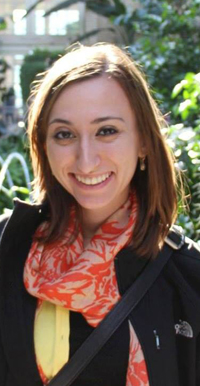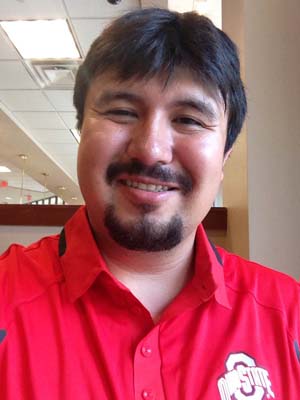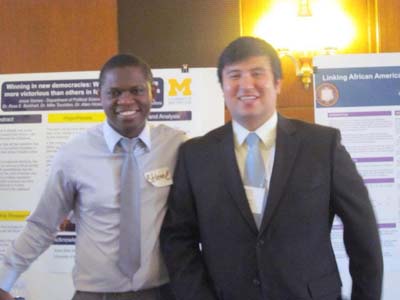Oct 22, 2015 | CLEA, Profile, Student Experiences
Developed by Lauren Guggenheim in coordination with Janie Velencia.
This is a post in a series about student involvement in research projects in the Center for Political Studies (CPS). Here, we profile Janie Velencia, whose work on the Constituency-Level Elections Archive (CLEA) helped influence her career path in political research.
 As an undergraduate student at the University of Michigan, Xhensila (Janie) Valencia was interested in participating in the University’s Undergraduate Student Research Opportunity Program (UROP). Through the program, she sought a research project that would allow her to build work experience. “I interviewed for several interesting projects, but CLEA fit best with my majors in political science and international studies and sounded the most promising in terms translating into work skills,” she says. She could not have guessed at the time how helpful CLEA would be in that regard.
As an undergraduate student at the University of Michigan, Xhensila (Janie) Valencia was interested in participating in the University’s Undergraduate Student Research Opportunity Program (UROP). Through the program, she sought a research project that would allow her to build work experience. “I interviewed for several interesting projects, but CLEA fit best with my majors in political science and international studies and sounded the most promising in terms translating into work skills,” she says. She could not have guessed at the time how helpful CLEA would be in that regard.
CLEA is a repository of detailed results from lower house elections from around the world. CLEA provides opportunities for students to be involved at all stages of the data collection process, providing valuable experience and training for them. Working on research projects can be an excellent way for students to explore whether they would like to further their career in research and academia. Many of CLEA’s alumni have gone on to attend graduate school and obtain research-oriented jobs.
Janie remembers her most interesting work with CLEA data: “I’m originally from Albania and immigrated to Michigan with my family at the age of 5, so when I saw that there was a data file on Albania, I immediately volunteered for it” she says. Because she is fluent in Albanian, and is familiar with its political history, she found that file interesting and easier to work with than some of the others, specifically because she could recognize the names of parties in both English and Albanian without having to overcome some of the usual language barriers that sometimes arise when working with the data.
She also found that focusing on the data from specific countries allowed her to learn interesting things about the political history and mood of a country. In particular, Poland stood out to her because they went from having few parties after the fall of communism to many parties, including the Beer Lover’s Party, whose platform was to promote cultural beer drinking in the country.
Janie credits her work with CLEA for helping her land an internship in the U.S. Senate, and later a job at a company called Congressional Quarterly / Roll Call, a subsidiary of the Economist Group that provides congressional research and reporting to subscribers. She was told that it was specifically her work with CLEA that made her uniquely qualified for the researcher position right out of college. She had been working there for about a year and a half when an opportunity arose for a new position that would allow her not only to work with data, but also to broaden her experiences to interpret the data and write about her results.
Currently, she works at Huffington Post as an editor for a team called HuffPost Pollster where she participates in tracking and aggregating political polls in the U.S., including all the races leading to the 2016 election. She writes articles based on poll results and contributes to a weekly polling newsletter. She believes her CLEA training also helped her attain this job.
Janie sees many parallels between her current position and her work with CLEA. “I think it’s vital to provide free accessible information about elections and public opinion for both research purposes and the public good.” She has allowed the notion to carry her into her current job. “Being able to contribute in a way that makes information accessible to the public, is what I do now, and it is also one of the great things about CLEA,” she added. Being cited by news outlets for her research is both exciting for her and satisfying because it means that the public is directly benefiting from data she helped collect and analyze.
Nov 19, 2013 | CLEA, Profile, Student Experiences
Developed by Katie Brown and Josue Gomez.
This is the first post in a series about students working on research projects in the Center for Political Studies (CPS). Here, we profile Josue Gomez, whose work on the Constituency-Level Elections Archive (CLEA) helped influence his career path in political science.
 Josue Gomez was raised in a farming community in southern Idaho, the son of a Mexican-American farm worker. The current debate on immigration policy, especially the relationship between the U.S. and Mexico, piqued his interest in politics. He enrolled at Boise State University — the first in his family to attend college — and majored in political science. As part of the McNair Scholars program supporting under-represented students, Josue was required to complete a summer research program prior to graduating. Josue and his advisor, Ross Burkhart, identified the University of Michigan as a good place to apply, and Josue was accepted as part of the Student Research Opportunity Program (SROP) at Michigan. Through the SROP program, he joined the Constituency-Level Elections Archive (CLEA) project as a research assistant in the Summer of 2012.
Josue Gomez was raised in a farming community in southern Idaho, the son of a Mexican-American farm worker. The current debate on immigration policy, especially the relationship between the U.S. and Mexico, piqued his interest in politics. He enrolled at Boise State University — the first in his family to attend college — and majored in political science. As part of the McNair Scholars program supporting under-represented students, Josue was required to complete a summer research program prior to graduating. Josue and his advisor, Ross Burkhart, identified the University of Michigan as a good place to apply, and Josue was accepted as part of the Student Research Opportunity Program (SROP) at Michigan. Through the SROP program, he joined the Constituency-Level Elections Archive (CLEA) project as a research assistant in the Summer of 2012.
CLEA is a repository of detailed election results from around the world which collects outcomes from lower house elections. CLEA provides opportunities for students to be involved at all stages of the data collection process, providing valuable experience and training for them. Working on research projects can be an excellent way for students to explore whether they would like to further their career in research and academia. Many of CLEA’s alumni have gone on to attend graduate school and obtained research-oriented jobs.
As part of his responsibilities on the CLEA project, Josue was assigned to work on Latin American and a few European countries. Given his fluency in Spanish and natural inclination to learn about these countries, Josue grew a strong connection to the project. Among the countries he was assigned to work on, he was encouraged to choose one to study in more depth. Chile was the largest country in Latin America that was not yet represented in CLEA, and Josue decided that it would be valuable for CLEA to include it. As Josue studied the intricacies and results of elections in Chile, he became interested in a broader research agenda concerning political parties and democratization. Prior to the military dictatorship of Augusto Pinoche, Chile had held elections After the dictatorship was removed, Chile began to hold elections again. In his studies, Josue began to wonder how relationships between parties and an old regime (in Chile’s case, the dictatorship) influence the performance of the parties in elections during and following the transition to democracy.
At the time, Josue was a senior at Boise State University. In his work on CLEA he identified what became a fundamental question for him: How do parties succeed in foundational elections? CLEA also helped him begin to answer this question.
As a McNair Scholar, Josue published a short article based on his work with CLEA. In the  paper, Josue lays out a spectrum of parties that exist in new democracies, in order to help understand why some parties are more successful than others. Focused on Latin America, Josue finds a relationship between party alignment in older regimes and success in new elections.
paper, Josue lays out a spectrum of parties that exist in new democracies, in order to help understand why some parties are more successful than others. Focused on Latin America, Josue finds a relationship between party alignment in older regimes and success in new elections.
Josue notes that political scientists and other researchers are always looking for reliable data like that provided by CLEA. By examining the electoral rules and election results from countries around the world, researchers can discover what electoral systems work better in certain regions and in certain time frames, investigate how political parties developed or declined, and seek to understand whether and why the democratic experience is working or not.
Josue’s experience in building social science infrastructure and his own research skills in his work with CLEA laid the foundation for his McNair Scholars paper, and has also influenced his academic path. The experience has led him to pursue a Ph.D.; he is currently enrolled as a graduate student in the Department of Political Science at The Ohio State University
 As an undergraduate student at the University of Michigan, Xhensila (Janie) Valencia was interested in participating in the University’s Undergraduate Student Research Opportunity Program (UROP). Through the program, she sought a research project that would allow her to build work experience. “I interviewed for several interesting projects, but CLEA fit best with my majors in political science and international studies and sounded the most promising in terms translating into work skills,” she says. She could not have guessed at the time how helpful CLEA would be in that regard.
As an undergraduate student at the University of Michigan, Xhensila (Janie) Valencia was interested in participating in the University’s Undergraduate Student Research Opportunity Program (UROP). Through the program, she sought a research project that would allow her to build work experience. “I interviewed for several interesting projects, but CLEA fit best with my majors in political science and international studies and sounded the most promising in terms translating into work skills,” she says. She could not have guessed at the time how helpful CLEA would be in that regard.


